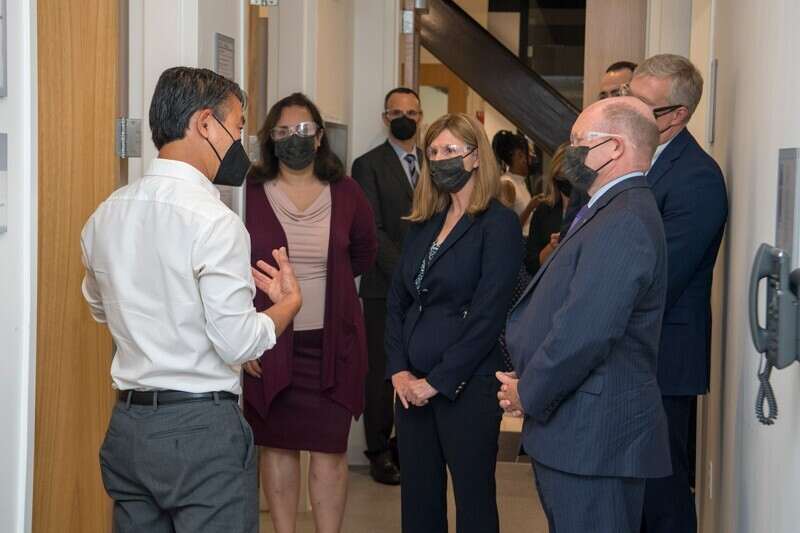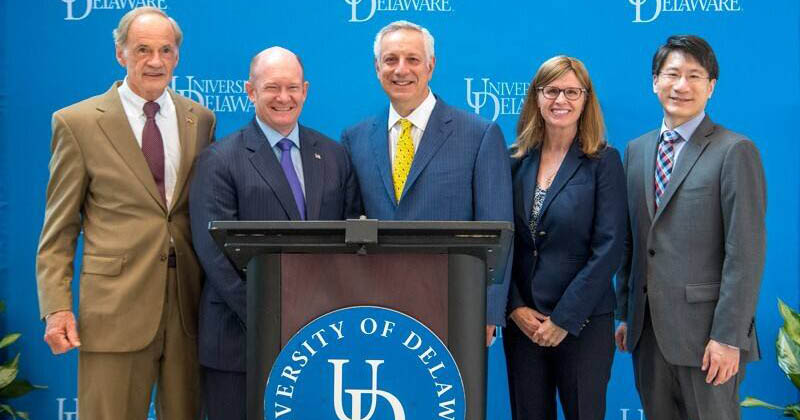UD, NIIMBL awarded $8 million for biopharma manufacturing center
Developing life-saving medicines is no easy feat. Manufacturing them quickly, consistently and with repeatability is even more challenging.
The National Institute for Innovation in Manufacturing Biopharmaceuticals (NIIMBL), a public-private partnership headquartered at the University of Delaware’s Science, Technology and Advanced Research (STAR) Campus, has been working on these problems since 2017. NIIMBL’s mission is to expedite and improve the manufacture of large-molecule medicines made from living cells, including insulin, monoclonal antibodies, cancer medicines, vaccines, cell therapies and gene therapies.
Now, with $8 million in congressionally directed spending from the National Institute of Standards and Technology (NIST) and the Department of Health and Human Services, biopharmaceutical manufacturing researchers will take things one step further – advancing UD’s leadership in biopharmaceutical manufacturing, innovation and workforce training.
NIST Director Laurie Locascio, who was on-site for the announcement, called NIIMBL a thriving institute and biopharmaceutical ecosystem that will play a key role in strengthening advanced manufacturing capability and pharmaceutical industry supply chains.
“The work you do helps make sure that breakthrough inventions don’t get stuck in labs and don’t get made overseas. They will get manufactured here in the United States where we need them and where we need good jobs,” said Locascio.
The federal funding, part of previously announced investments directed to UD earlier this year as part of the federal government’s $1.5 trillion omnibus spending bill, will support two large-scale projects. A $3 million investment from NIST, part of the Department of Commerce, will enable UD to acquire biopharmaceutical manufacturing equipment to support innovation relevant to the NIIMBL mission. An additional $5 million from the Department of Health and Human Services’ Health Resources and Services Administration will support the design of a current Good Manufacturing Practice (cGMP) facility, which is envisioned to serve as both a testbed for new technologies and a hands-on training facility on STAR Campus.
The University has invested significant resources to strengthen and expand its capacity for ground-breaking research and academic programs in biopharmaceuticals in recent years. UD President Dennis Assanis thanked Delaware’s congressional delegation for championing this funding for these critical projects at UD, which will facilitate the development of processes and protocols for more efficient manufacturing of bio-based medicines.
“It is critical that the people who work in the biopharmaceutical manufacturing industry have the skills and experience they need to ensure that products are consistently made to the highest quality standards,” said Assanis. “That’s why the new manufacturing training facility that this funding will help enable is truly a game-changer for our state and our region.”

NIST Director Laurie Locascio and members of the Delaware congressional delegation toured NIIMBL to learn about the innovative work underway at the University of Delaware’s Ammon Pinizzotto Biopharmaceutical Innovation Center on Tuesday, Sept. 6.
The envisioned facility, tentatively named the Securing American Biomanufacturing Research and Education (SABRE) Center, will enable the demonstration of manufacturing innovations in a production-relevant environment on a wide variety of cutting-edge biopharmaceuticals, such as gene therapies, mRNA vaccines and other biopharmaceuticals. The goal is to provide a collaborative space for the biopharmaceutical ecosystem to accelerate the development of novel manufacturing technologies and approaches into widespread commercial adoption.
As a training ground for students, such a center will help ensure the nation’s future workforce has the relevant technical skills, hands-on training and expertise with equipment and processes that most closely mirror biopharmaceutical manufacturing facilities.
“We have the opportunity to lay the groundwork for workforce development training for manufacturing and for research for this century, to keep us at the absolute forefront of global biopharmaceutical manufacturing,” said U.S. Senator Chris Coons, calling the $230 million invested in NIIMBL to-date a great return on investment.
The cGMP facility could also lead to expanded partnerships with other institutions and the local biopharmaceutical industry to attract even more manufacturing jobs to the area.
“Delaware’s ability to be a recognized leader and effective partner really reflects the excellence we have within our community, our people and our organization,” said Kelvin Lee, founding director of NIIMBL, UD’s interim vice president for research, scholarship and innovation, and the Gore Professor of Chemical and Biomolecular Engineering. “Leadership and effective partnership also are hallmarks of our federal delegation who work tirelessly in support of all Delawareans.”
NIIMBL, which now has more than 200 partners from industry, academia and government, is housed in the Ammon Pinizzotto Biopharmaceutical Innovation Center on UD’s STAR Campus. It is bordered by other buildings and laboratories full of promising research in health care, biotechnology, financial technology, biomedical engineering, data science and analytics, agriculture, advanced materials and more.
U.S. Sen. Tom Carper remarked on the significant historical connection to manufacturing on the 272-acre STAR Campus, which sits on the former grounds of the Chrysler automotive assembly plant, built in 1951. It was a fitting nod to the past, even as we look to the future.
“This is where tanks were built to help the war effort, and then automobiles were made here until about 15 years ago,” Carper said. “We’re not building cars in Delaware anymore, but it turns out we’re very good at coming up with ideas for pharmaceuticals, whether it’s to take on a pandemic or dementia or any number of other maladies we face.”
Article by Karen B. Roberts | Photo by Kathy F. Atkinson (featured on UDaily, 09/08/2022)

